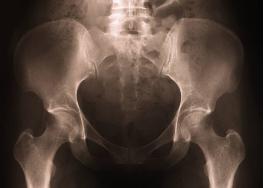 Osteoporosis more commonly hits in your older years due to hormone changes however younger people can get osteoporosis as it’s not a normal part of ageing. It can affect both men and women. Osteoporosis is a disease that thins the bones and can lead to them fracturing easily. Often after menopause when a woman’s body stops producing oestrogen, which protects the bones, you can get osteoporosis. People who have not taken enough calcium throughout their life can also contract the disease. Other things such as smoking too much, lack of vitamin D, long term medication for thyroid problems, rheumatoid arthritis, too much alcohol, or a family history of the disease can play a part in contracting the disease. You may also be at risk if you have not had menstrual periods for some time.
Osteoporosis more commonly hits in your older years due to hormone changes however younger people can get osteoporosis as it’s not a normal part of ageing. It can affect both men and women. Osteoporosis is a disease that thins the bones and can lead to them fracturing easily. Often after menopause when a woman’s body stops producing oestrogen, which protects the bones, you can get osteoporosis. People who have not taken enough calcium throughout their life can also contract the disease. Other things such as smoking too much, lack of vitamin D, long term medication for thyroid problems, rheumatoid arthritis, too much alcohol, or a family history of the disease can play a part in contracting the disease. You may also be at risk if you have not had menstrual periods for some time.
When people get older and their bones thin with the disease the risk of a hip fracture increases. Often there are no symptoms. Some people don’t even know until they have a small accident and damage themselves. They then experience the pain of a fracture or a collapsed vertebrae.
If you do have osteoporosis you should be aware of the dangers in your own home. Situations that may cause you to fall should be avoided such as items lying all over the floor. If you do fall it could result in fracture. Easy ways to help safeguard your home is to ensure there is good lighting both inside and out, be careful when getting in and out of the shower and removing slippery rugs or mats that may cause you to trip. Other ways to help with osteoporosis could be to give up smoking and take it easy on drinking alcohol. Maintain a healthy body weight and be sure to not lose weight too quickly as this can contribute to bone loss.
Regular exercise will help protect your body. You need about 30 minutes a day. Weight bearing exercises are the best as these put weight on your skeleton which builds strength and better balance. Walking, jogging, dancing and yoga are also good exercises to do. You should also try to have a healthy diet and add a few supplements if needed with regular health check-ups with a trained professional.
The doctor may send you for a bone density test. If you are taking regular medication you need to check if it is affecting your bone density. Some menopausal women may find that their bones weaken faster than others and even hormone replacement therapy (HRT) does not take out the risk factor of weaker bones. When women stop taking HRT, they experience as much bone loss as they would have lost at menopause which is why it is a good idea to have a bone density test at menopause and another at ceasing HRT. If you attend to osteoporosis early in the picture however your doctors can treat the osteoporosis with drugs that help prevent the bone loss and help rebuild the bone. Remember though that there are health risks associated with taking drugs especially HRT.
If you have osteoporosis or want to prevent it then it is important to have a healthy diet rich in calcium and vitamin D. A lot of milk and cheese can be bad for your sinuses though so a daily multivitamin can be a good way to boost your calcium. Eating leafy green vegetables and salmon is good for you. Make sure you have a few minutes in the sun every day for your vitamin D levels and it’s a good idea to visit your natural therapist to check exactly what supplements you should be taking so you don’t become deficient. If you attend to all of the above you will find that the burden of having an illness such as osteoporosis is not quite as hard to deal with and in many ways preventable.
